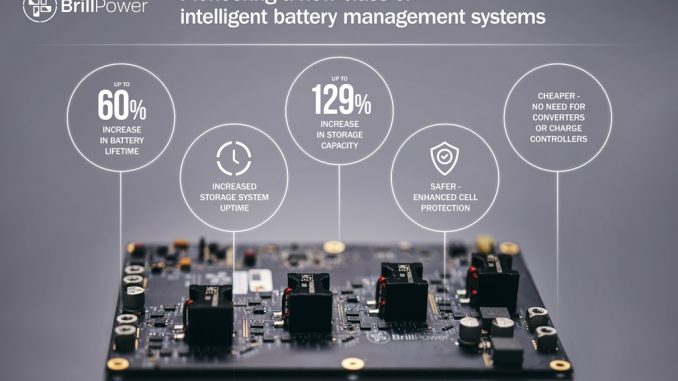
Brill Power launched a new category of ‘intelligent’ battery management systems set to revolutionise the performance of stationary energy storage.
Brill Power is an Oxford University spin-out company and with their breakthrough technology will transform the cost and performance of energy storage systems by increasing battery life by up to 60%, enhancing storage capacity by up to 129%, increasing systems uptime and drive down the lifetime operating costs for energy storage systems.
The BrillMS B62 Premium battery management system eschews the compromises inherent in the two existing categories of BMS. Until today, energy storage solutions relied upon either passive balancing or more costly active balancing options in order for batteries to operate safely and efficiently. Brill Power’s intelligent battery management system represents a paradigm shift forward for battery performance without reliance on advances in materials or cell chemistry.
The BrillMS B62 Premium is the first in a series of novel BMS product launches from Brill Power intended to transform both the stationary energy storage market as well as the motive application of battery cells in electric vehicles.
An Intelligent Approach
At the heart of this new, intelligent approach to battery management is a solution to the challenges of performance, lifetime and safety of series-connected battery cells that have previously been defined by the weakest cells in the pack. Brill Power has solved this problem through a patented approach to optimised cell-level current control. And crucially, Brill has designed the hardware and software to implement it. Proprietary algorithms determine the state of health and power capability of every parallel-connected cell block in the battery and novel control circuitry regulates the electric current accordingly. Stronger cell blocks are exposed to higher currents and weaker ones to lower currents. This ensures that every joule of energy is extracted from each individual cell during every discharge cycle. As a result, no single cell limits the energy storage capacity, power capability or lifetime of the battery system.
Not only does the intelligent BMS increase battery lifetime by up to 60% and has been demonstrated to unlock up to 129% more energy storage capacity, but it additionally provides three game-changing benefits. Firstly, levels of reliability and uptime are drastically enhanced since faulty battery cells and modules can be bypassed and replaced while the battery system remains fully operational. Secondly, with regulated battery output voltage, the battery can also be directly connected to other power sources or loads in the system, such as solar photovoltaic arrays or electric vehicle chargers without the need for a costly DC/DC converter or charge controller. And in addition to these multiple benefits, Brill Power’s BrillMS B62 Premium BMS enhances safety through cell-level protection that prevents currents exceeding safe limits and any cells approaching hazardous conditions can be isolated.
Technology For Its Time
 With the US Department of Energy already projecting that energy storage solutions will exceed 300GWh by 2030, the merits of driving performance and efficiency into localised energy solutions have been put into sharp focus in recent weeks with exponential rises in wholesale energy prices on global markets. Battery-based energy storage solutions in turn enable renewable sources such as solar and wind to be more dependably used in both domestic and commercial contexts.
With the US Department of Energy already projecting that energy storage solutions will exceed 300GWh by 2030, the merits of driving performance and efficiency into localised energy solutions have been put into sharp focus in recent weeks with exponential rises in wholesale energy prices on global markets. Battery-based energy storage solutions in turn enable renewable sources such as solar and wind to be more dependably used in both domestic and commercial contexts.
Today’s launch is founded on over a decade of PhD research into battery degradation, battery modelling and power electronics by Brill Power’s engineering team while at the University of Oxford. Brill Power was formed to commercialise this know-how in 2016 and is backed by University of Oxford and supported by Oxford Science Enterprises, Oxford Investment Consultants, Skunkworks Investment Corporation, Innovate UK, the EIT Climate-KIC, the Royal Academy of Engineering, the Advanced Propulsion Centre, the Department for Business, Energy & Industrial Strategy and Carbon Limiting Technologies.
Tried and tested
The BrillMS B62 Premium is particularly valuable for applications where the battery is a mission-critical component, such as uninterruptible power supplies (UPS), telecoms, medical and defence. The technology has been extensively tested and validated by independent assessment and validation authorities, including DNV, a globally-renown international accredited registrar and classification society:
DNV, the independent energy expert and assurance provider, has acted as technical consultant through the testing and verification of Brill Power’s new battery management system (BMS) technology. This testing confirms that Brill Power’s novel BMS concept brings advantages for a number of key battery characteristics like higher utilized pack capacity, that potentially result in lower lifetime cost. DNV also concluded that the Brill Power BMS complies with the functional safety requirements of standards IEC62619, UL1973, UL9540 and VDE-AR-E 2510-50.
Editor’s Note: The problem with the status quo
Every battery needs a battery management system (BMS), which is a little-known but all-important component ensuring that lithium-ion and other battery chemistries operate safely and effectively. Up until now, there have been only two types of BMS available to battery system developers: those that perform passive balancing and those that perform active balancing. The limited choice is driven by limited expectations because the BMS is typically only expected to do one thing: keep the battery cells safe by stopping them from getting over-charged or over-discharged, too hot or too cold, or overloaded with electric current. Presently, if a battery system developer needs a top-end BMS, they utilise an active balancing BMS, which helps improve round-trip efficiency. But the additional cost typically doesn’t justify this marginal benefit, so passive balancing is the go-to option. In battery design, the BMS is typically viewed as a means to an end, a necessary evil to maintain the required safety level. Most of the innovation and technological improvements in batteries are expected to come from the battery cells and their materials. And a lot of innovation and improvements are needed to get battery lifetime, performance and even safety up to levels that are adequate for large-scale rollouts of energy storage and electric vehicles. Brill Power’s optimised cell-level current control brings a step-change improvement into the present, compared to active balancing with its low value for money or the performance, life and safety constraining solution of passive balancing.
Source: Brill Power










Be the first to comment